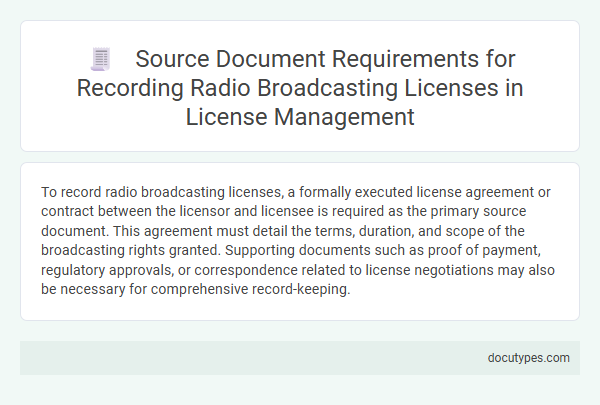To record radio broadcasting licenses, a formally executed license agreement or contract between the licensor and licensee is required as the primary source document. This agreement must detail the terms, duration, and scope of the broadcasting rights granted. Supporting documents such as proof of payment, regulatory approvals, or correspondence related to license negotiations may also be necessary for comprehensive record-keeping.
Introduction to Source Documentation in Radio Broadcasting Licenses
Source documentation is essential for accurately recording radio broadcasting licenses. It provides verifiable proof of the license's validity and terms, ensuring compliance with regulatory requirements. You need to obtain official license agreements or authorized government-issued certificates as primary source documents for proper record-keeping.
Importance of Accurate Source Documents in License Management
| Aspect | Details |
|---|---|
| Source Document Required | Official License Agreement or Authorization Certificate issued by the regulatory broadcasting authority. |
| Purpose of Source Document | Serves as legal proof of the right to operate radio broadcasting services within a designated frequency and location. |
| Key Information Included | License holder name, license number, frequency allocation, validity period, and terms and conditions. |
| Importance in License Management | Accurate source documents ensure compliance with regulatory requirements, facilitate audits, and protect against unauthorized broadcasts. Proper documentation also supports renewal processes and financial accounting related to licensing fees. |
| Consequences of Inaccurate Documentation | Risk of penalties, license suspension, or legal disputes. It can lead to operational interruptions and financial losses. |
| Best Practices | Maintain original copies and digital backups, verify document authenticity regularly, and update records promptly upon license changes. |
Core Types of Source Documents for Radio Broadcasting Licenses
Understanding the core source documents required to record radio broadcasting licenses is essential for accurate documentation and compliance. These documents serve as official proof of license ownership and terms.
- License Agreement - This formal contract details the rights granted to broadcast content over specific frequencies by regulatory authorities.
- Regulatory Approval Letters - Issued by communications authorities, these letters confirm the approval and conditions of the broadcasting license.
- Payment Receipts or Invoices - These financial documents verify the fees paid for obtaining or renewing the radio broadcasting license.
Your records should include these core source documents to ensure reliable and verifiable license recording.
Mandatory Information in Radio Broadcasting License Records
To accurately record radio broadcasting licenses, a valid source document such as the official license certificate issued by the regulatory authority is required. This document must contain specific mandatory information to ensure compliance and proper documentation.
Mandatory information in radio broadcasting license records includes key details that verify the legitimacy and scope of the broadcasting rights. You should ensure these elements are clearly recorded.
- Licensee Name - The official name of the individual or entity holding the license must be documented to establish ownership.
- License Number and Issue Date - The unique license identifier along with the date of issuance confirms the license's validity period.
- Broadcasting Parameters - Details such as frequency, power, and geographic coverage area define the technical scope authorized by the license.
Source Document Verification Procedures
Recording radio broadcasting licenses requires the original license agreement or certificate issued by the regulatory authority as the primary source document. Proper source document verification procedures ensure the license's authenticity, validity, and compliance with broadcasting regulations before recording.
- Receipt of Official License Document - Obtain the original license certificate or official agreement from the licensing authority as proof of broadcasting rights.
- Verification of License Authenticity - Cross-check the license number, issuing authority, and expiration date against the regulatory database to confirm validity.
- Documentation and Record Updating - Document verification outcomes and update broadcasting license records in the accounting or asset management systems accordingly.
Digital vs. Physical Source Document Management
Recording radio broadcasting licenses requires accurate source documents that verify the rights and terms granted. Digital source document management allows for streamlined access, easier updates, and secure storage compared to physical documents that may be prone to loss or damage. Ensuring Your licensing records are maintained digitally improves audit trails and compliance efficiency.
Compliance Standards for Documenting Broadcasting Licenses
The primary source document needed to record radio broadcasting licenses is the official license certificate issued by the relevant regulatory authority, such as the Federal Communications Commission (FCC) in the United States. This document verifies the broadcaster's legal authorization to operate on specified frequencies and outlines the terms and conditions of the license.
Compliance standards require maintaining original or certified copies of these licenses to ensure accurate and auditable records. Proper documentation supports regulatory audits, license renewal processes, and adherence to broadcasting laws and policies.
Common Challenges in Source Document Collection
What source document is needed to record radio broadcasting licenses? The primary source document required is the official license agreement issued by the regulatory authority overseeing radio communications. This document verifies your legal right to operate and ensures accurate record-keeping.
What are common challenges in collecting these source documents? You may face difficulties such as delayed issuance from authorities, incomplete paperwork, or discrepancies in licensing details. These challenges can hinder timely and accurate recording of radio broadcasting licenses.
Best Practices for Source Document Storage and Retrieval
When recording radio broadcasting licenses, the original license agreement or official government-issued permit serves as the primary source document. These documents verify legal permission to operate and include critical details like license duration, terms, and conditions.
Best practices for source document storage involve secure, centralized digital archives with indexed metadata for efficient retrieval. Your organization should implement version control and backup protocols to ensure documents remain accurate and accessible during audits or renewals.
What Source Document Is Needed to Record Radio Broadcasting Licenses? Infographic

